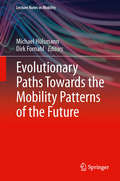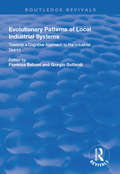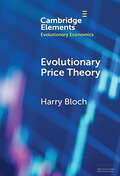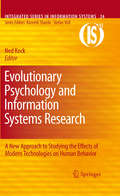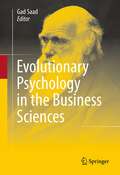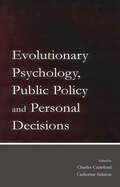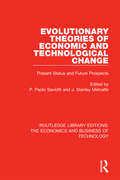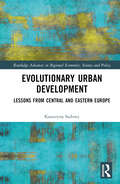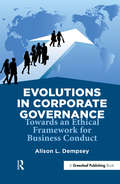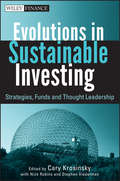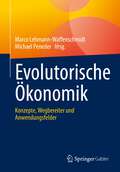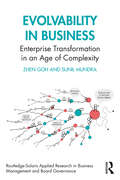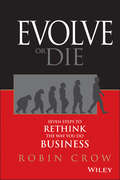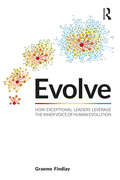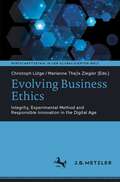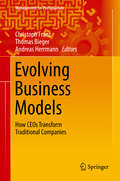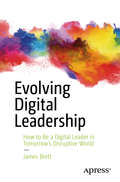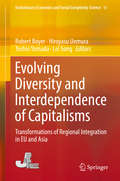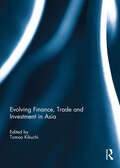- Table View
- List View
Evolutionary Paths Towards the Mobility Patterns of the Future
by Dirk Fornahl Michael HülsmannThis edited volume presents new insights and challenges in the field of electric mobility in relation to new mobility and infrastructure concepts as well as to renewable energies. The book covers the socio-economic view on the topic as well as technical aspects and thus offers valuable knowledge for future business models. It primarily addresses practitioners and researchers in the field but may also be of use to graduate students.
Evolutionary Patterns of Local Industrial Systems (Routledge Revivals)
by Fiorenza Belussi Giorgio GottardiPulished in 2000, a selection of contributions presented in 1998 at the conference of Udine entitled, "The Development of Industrial Districts in Italy". The theoretical aim of the book is to explain the dynamic mechanism of the growth of Italian "industrial districts" shifting attention from "Marshallian industrial districts", where focus is not just on the decentralization of production among small-batch firms. Determinant factors explaining growth seem related to the ways in which firms explore the markets, learn tacit knowledge, network with subcontractors and make incremental innovations. In substance, the work offers a cognitive approach to the issue of industrial districts.
Evolutionary Political Economy in Action: A Cyprus Symposium (Routledge Advances in Heterodox Economics)
by Savvas Katsikides Hardy Hanappi Manuel Scholz-WäckerleThe world is in turmoil, the dynamics of political economy seem to have entered a phase where a ‘return to normal’ cannot be expected. Since the financial crisis, conventional economic theory has proven itself to be rather helpless and political decision makers have become suspicious about this type of economic consultancy. This book offers a different approach. It promises to describe political and economic dynamics as interwoven as they are in real life and it adds to that an evolutionary perspective. The latter allows for a long-run view, which makes it possible to discuss the emergence and exit of social institutions. Evolutionary Political Economy in Action consists of two parts. Part I provides a broad range of issues that show how flexible evolutionary political economy can handle acute policy problems in Europe: should Europe support the revived build-up of NATO forces on its Eastern border, or should it rather aim at economic cooperation with Russia? How can democracy for a whole continent be reasonably further developed; what is the role of economies of scope? Do the new protest movements against inequality provide alternatives? What could a vision for a unified, socioecological Europe look like? Part II takes a closer look at Cyprus and Greece, where the problems of the financial crisis have been exacerbated by the ‘solutions’ imposed on them by the troika. In all of these essays, the authors demonstrate the unique insights which can be garnered from adopting an evolutionary political economy approach and consider the real solutions that such an approach points towards. This volume is extremely useful for social scientists in the fields of economics, politics and sociology who are interested to learn what evolutionary political economy is, how it proceeds and what it can provide.
Evolutionary Price Theory (Elements in Evolutionary Economics)
by Harry BlochEconomic evolution involves structural change from within, so evolutionary price theory needs to address how prices facilitate and accommodate this structural change and how structural change in turn impacts on prices. Such analysis is impossible using neoclassical price theory in which endowments of inputs, production technology and consumer preferences are all treated as exogenously determined and the future is known or at least its probability distribution is known. An alternative theory of price determination outlined in this book is compatible with structural change from within and an unknown future. The theory employs an open-system ontology and a micro-meso-macro methodology. Prices have a dual informational role in evolutionary economics. As well as coordinating ongoing production and consumption activities, prices provide information to guide potential entrepreneurs and their financiers in evaluating the profitability of innovations. The latter role can substantially disrupt the order created in the former role.
Evolutionary Psychology and Information Systems Research
by Ned KockThe point of Information System (IS) EP research then is that these evolved psychological traits very likely influence our behavior toward modern technologies, and a deeper understanding of how technology affects behavior might be achieved by applying concepts and theories from EP. Springer author Ned Kock (Information Systems Action Research: An Applied View of Emerging Concepts and Methods) is probably the leading scholar in IS-EP research, and he is proposing an AoIS volume to gather together for the first time invited papers on EP concepts and theories that can be used as a basis for future research; examples of ongoing IS-EP research; and a look at the current debate on IS-EP research. Kock will invite leading scholars in IS and IS-EP research as well as the leading scholars in pure EP (see attached proposal for all names) to contribute papers. Topics to be covered include basic human behavior toward technology; interface design; online dating and consumer behavior; information search and use behavior; and autopoiesis and self-organizing information systems.
Evolutionary Psychology in the Business Sciences
by Gad SaadAll individuals who operate in the business sphere, whether as consumers, employers, employees, entrepreneurs, or financial traders to name a few constituents, share a common biological heritage and are defined by a universal human nature. As such, it is surprising that so few business scholars have incorporated biological and evolutionary-informed theories within their conceptual toolboxes. This edited book addresses this lacuna by culling chapters at the intersection of the evolutionary behavioral sciences and specific business contexts including in marketing, consumer behavior, advertising, innovation and creativity, intertemporal choice, negotiations, competition and cooperation in organizational settings, sex differences in workplace patterns, executive leadership, business ethics, store design, behavioral decision making, and electronic communication. To reword the famous aphorism of T. G. Dobzhansky, nothing in business makes sense except in the light of evolution.
Evolutionary Psychology, Public Policy and Personal Decisions
by Charles Crawford Catherine SalmonDuring the last 15 years, human sociobiology has metamorphosed into evolutionary psychology. It is concerned with the social problems and stresses hominid and primate ancestors encountered, the psychological mechanisms natural selection shaped to deal with these stresses, and the way those ancient mechanisms work now. Evolutionary psychologists are making great progress in expanding the understanding of human nature, however, this knowledge has had little impact on policymakers and legislators. Supreme Court justices and managers seldom consult evolutionary psychologists to help with their deliberations. When faced with private decisions few individuals ask themselves how a Darwinian perspective might help them. This volume's aim is to start the process of using theory and findings of evolutionary psychology to help make the world a better place to live. This book takes evolutionary psychology explicitly into applied areas in a way no other book has. It includes a reasonable scope of applications from pornography to psychopaths and from morality to sex differences in the workplace. An applications section provides concrete ideas for dealing with social and policy issues, including chapters on women in the workplace, rape, and child support. Providing good coverage of basic issues and theory of the field, this book gives lay people and law/policymakers appropriate background to fully understand the applications chapters. Part II provides information on basic psychological mechanisms for group living--including chapters on emotions, reciprocity and legal reasoning, and self deception--that impact on how well public policy and law function. The material in the first two sections provide an intellectual basis for the chapters in the third part of the book which deals with the application of evolutionary psychology to a variety of substantive areas related to public policy and personal decisions. A political scientist concludes the book with a commentary on evolutionary psychology and public policy. The book is designed to serve as a stand-alone text in evolutionary psychology and public policy that can be used in a variety of disciplines, such as psychology, social work, law and psychology, and public policy.
Evolutionary Social Theory and Political Economy: Philosophy and Applications (Economics as Social Theory)
by Clifford S. Poirot Jr.Evolutionary Social Theory and Political Economy traces the origins, extension, marginalization and revival of evolutionary approaches to social theory from the Enlightenment through the beginning of the 21st century. It demonstrates how changes in understandings of social evolution corresponded to changes in definitions of Political Economy and how both reflected changes in the Philosophy of Science. This book is written for students and researchers alike in all the social sciences. Economists will benefit from understanding how ideas about evolution in Economics corresponded to ideas about evolution in other social sciences, and Social Scientists outside of Economics will benefit from understanding how Economics has related to their discipline.
Evolutionary Theories of Economic and Technological Change: Present Status and Future Prospects (Routledge Library Editions: The Economics and Business of Technology #44)
by Valerie Slaughter BrownRecently, evolutionary theories of economic and technological change have attracted a considerable amount of attention which reflects the problems encountered by mainstream analysis of dynamic phenomena and quantitative change. This book, originally published in 1991, develops the debate and draws on the concepts of evolutionary biology, nonequilibrium thermodynamics, systems and organization theory. While recognizing that new technology is not the cause of quantitative change, the editors claim it should play a more central role in economic theory and policy. At the same time, the ground is laid for a more generalized concept of innovation and experimentation and their relation to routine activities. The book is intended for economists.
Evolutionary Urban Development: Lessons from Central and Eastern Europe (Routledge Advances in Regional Economics, Science and Policy)
by Katarzyna SadowyDrawing on a range of disciplinary approaches, this monograph explores the drivers of urban development. Through an evolutionary lens, cities are shown to find a development path amidst an ever-changing landscape, sometimes facing extreme externalities such as wars and economic crises. Key themes covered include urban growth, decentralization, path dependence, institutional change, governance, entrepreneurship and culture. Detailed case studies of the history-rich metropolises of Berlin, Budapest and Warsaw allow the author to examine the adaptive abilities of cities in flux, and draw conclusions with broader international relevance. This monograph will be valuable reading for advanced students and researchers in urban economics, evolutionary economics, institutional economics and Central European studies.
Evolutions in Corporate Governance: Towards an Ethical Framework for Business Conduct
by Alison L. DempseyIn a world where the implications and consequences of corporate actions and decisions are potentially far-reaching and lasting, ethical standards − their observance and their breach − must be part of the language of business conduct, whether in the context of corporate transgressions, regulatory effectiveness, terms of engagement between business and their stakeholders, or the metrics used by investors in assessing performance and risk and understanding long-term value. This critically important book proposes a new paradigm for understanding, developing and maintaining standards of corporate governance. Its point of departure is not a position along the diverse paths of traditional corporate governance and regulatory theory, law and practice, nor specific questions of how to institute, implement and observe policies and practices that function as proxies for good governance. Instead, it starts with the idea of framing governance generally, and corporate governance specifically, as a matter of conduct that is guided by a set of fundamental ideals and principles. Evolutions in Corporate Governance attempts to answer the wider question of how to re-imagine a framework within which ‘good’ corporate governance − that takes account of and is responsible for the social, environmental, ethical as well as legal and economic dimensions of business conduct − is addressed alongside issues of profitability and competition, in the face of forces of globalization and business influence that are testing the limits of what can be accomplished by traditional law and regulation. Dempsey contends that meaningful change in behaviour will only come when there is a corporate governance framework that explicitly encompasses both law and ethics.
Evolutions in Sustainable Investing
by Cary Krosinsky Nick Robins Stephen ViedermanSustainable Investing is fast becoming an essential method of generating long-term returns, moving beyond the negative approaches to socially responsible investing that have dominated the field. This book, our second on the subject, provides over 15 case studies of leading global investors and companies demonstrating how they successfully apply sustainability aspects to their core strategies. Learn from prominent thought leaders Dan Esty and Paul Hawken among others who have contributed key chapters. Our chapter on performance shows clearly how these strategies have been working once negative approaches are parsed out by those examining fund returns. This book also examines in great depth what data exists, and what's on the horizon, to best measure & capture sustainability successfully. Regional perspectives, including 3 chapters on Asia, and focuses on Canada, Australia, Africa & India are also included, as is a look across asset classes. Sustainable Investing, when performed with a positive perspective, has been outperforming the mainstream, unlike negative approaches designed to match benchmark returns. From eco-efficiency to sustainability-driven innovation and beyond, investors of all shapes & sizes need to know how best to position themselves for the radical market shifts underway.
Evolutions of Capitalism: Historical Perspectives, 1200–2000
by Catherine Casson and Philipp Robinson RössnerThis ambitious collection follows the evolution of capitalism from its origins in 13th-century European towns to its 16th-century expansion into Asia, Africa and South America and on to the global capitalism of modern day. Written by distinguished historians and social scientists, the chapters examine capitalism and its critics and the level of variation and convergence in its operation across locations. The authors illuminate the aspects of capitalism that have encouraged, but also limited, social responsibility and environmental sustainability. Covering times, places and topics that have often been overlooked in the existing literature, this important contribution to the field of economic history charts the most comprehensive chronology of capitalism to date.
Evolutorische Finanzökonomie: Ein Plädoyer für eine neue Sichtweise der Finanzmärkte und ihrer Institutionen (essentials)
by Thomas HoltfortDieses Buch beschäftigt sich mit der Thematik der evolutorischen Finanzökonomie. Diese kann als eine Möglichkeit der Weiterentwicklung bisheriger Finanztheorien bzw. -ansätze (wie bspw. die Effizienzmarkttheorie oder der Behavioral-Finance-Ansatz) gesehen werden und beleuchtet dabei den Zusammenhang zwischen einerseits biologischen bzw. darwinistischen Begriffen und Konzepten (z.B. Selektion, Mutation und Adaption) und andererseits finanzökonomischen Fragestellungen. Das Ziel des Buches besteht darin, eine neue und integrative Sichtweise in der Betrachtung von Finanzmarktprozessen und deren institutionellen Teilnehmern aufzuzeigen.
Evolutorische Ökonomik: Konzepte, Wegbereiter und Anwendungsfelder
by Marco Lehmann-Waffenschmidt Michael PenederZur Analyse des wirtschaftlichen Wandels benötigt man wissenschaftlich fundierte Konzepte, Methoden und Instrumente, die der Verlaufs- und Ergebnisoffenheit von Prozessen in realer Zeit Rechnung tragen. In kompakten Einzelbeiträgen fasst der vorliegende Band die grundlegenden Konzepte und Methoden der Evolutorischen Ökonomik zur Untersuchung von Prozessen des wirtschaftlichen Wandels zusammen. Ausgewählte Anwendungsfelder belegen sowohl die wissenschaftliche Bedeutung als auch die gesellschaftliche Relevanz des evolutionsökonomischen Ansatzes. Der interdisziplinäre Diskurs zeigt Anknüpfungspunkte z.B. zur Psychologie, Verhaltensforschung oder Politikwissenschaft. Ein ideengeschichtlicher Überblick zu den Wegbereitern der Evolutorischen Ökonomik rundet das Bild ab. Wie ein Kaleidoskop, das trotz der disparat liegenden Einzelteile ein Muster zeigt, unterstreicht der Band die Einheit des evolutorischen Denkens in der Ökonomik innerhalb einer Vielfalt unterschiedlicher Themen und methodischer Ansätze. Darin kommen der plurale Charakter sowie die Experimentierfreudigkeit und Offenheit für innovative Ansätze dieser Forschungsrichtung zum Ausdruck.
Evolvability in Business: Enterprise Transformation in an Age of Complexity (Routledge-Solaris Applied Research in Business Management and Board Governance)
by Sunil Mundra Zhen GohThrough the unique combination of evolutionary biology and management theory applied to business cases, and keeping in mind that organisations are fundamentally human systems, Goh and Mundra propose organisational evolvability as a new frame to guide enterprise transformation and change.Some of the topics covered in the book include: Understanding the differences between Complicated and Complex; Moving from Planned Change to Emergent Change; Applying principles of evolution to enterprise evolvability, and how to operationalise it using a Sense-Adapt-respond loop; Identifying and addressing Sensemaking gaps; including different approaches to scaling and repaying organisational debt; Measuring outcomes under conditions of complexity. This book proposes that transformation is not a one-and- done event but a continuous process of adapting to a dynamic and unpredictable environment. The goal of transformation should be to enhance organisational evolvability – the capacity of a system for adaptive evolution. This book encourages leaders and practitioners to view organisations as open and complex adaptive systems and provides frameworks that help them to manage transformations with adaptive grace.A perfect volume for managers, executives and leaders at companies of all sizes. It will also be of interest to instructors in executive education, as well as scholars in organisational studies and business management. This book is for anyone seeking to create a culture of adaptability and change.
Evolve or Die
by Robin CrowBring positive change and attain the highest levels of successRobin Crow has years of experience working in the trenches as an entrepreneur and business owner. Now he has put all that work at your disposal with his unique Seven Step Challenge. Presented as a call to action, Evolve or Die delivers optimistic solutions to become better than you were yesterday and realize abundance at every level for personal and professional growth. The method teachesExceed expectationsGets things done100% accountabilityCommit to continual improvementBoundless optimismEnvironmental responsibilityMake a differenceWhether you're the CEO or cleaning the CEO's office, by following the author's program you'll be able to regain control, refocus, and bring positive change to attain the highest levels of success.
Evolve: How exceptional leaders leverage the inner voice of human evolution
by Graeme FindlayLeaders work hard to develop strong leadership capabilities in today’s modern organizations, for the benefit of their teams and for their own careers. But, sometimes conventional leadership theory fails to explain why our efforts fail to make an impact, and arguably are becoming less and less successful. Why would this be? The answer lies in our evolutionary history. Leadership is integral to our success and evolution as a species, as larger better functioning groups out-survived fragmented groups that did not benefit from strong leadership. Leader-follower relationships are, therefore, deeply ingrained in our brains, our instincts and our behaviour. But, our modern world, with its technology, connectedness and complexity, has evolved much faster than our brains – and our leader-follower behaviour has not caught up. Evolve charts the fascinating development of our evolutionary history to provide a profound understanding of human behaviour around leadership. It also establishes a framework for the modes of leadership that shape the world today. Through case studies and real-world examples, you will gain powerful insights into the nature of leadership now. More importantly, these insights inform the actions you can take in your own life to enable you to become a more aware, mindful, impactful, and successful leader.
Evolving Business Ethics: Integrity, Experimental Method and Responsible Innovation in the Digital Age (Wirtschaftsethik in der globalisierten Welt)
by Christoph Lütge Marianne Thejls ZieglerBusiness ethics as a discipline has been evolving rapidly, and indeed needs to evolve constantly. This evolution is mandated more urgently than ever before as we plunge headlong, and with increasing velocity, into the era of automation, artificial intelligence and digitization. In a scenario where legal and policy guidelines are scarce or ambiguous, the role of business ethics in guiding academic and industrial research and innovation cannot be understated. Ethical codes and guidelines are needed for educators, scientists, industries, law and policy makers, as well as for the general public engaged with emerging technologies not only to ensure a smooth transition into the autonomous and digital age, but also to ensure that in the process, we do not unknowingly disengage from basic human rights, values and responsibilities. Traditional, time tested and universally accepted principles of (business) ethics, including principles of integrity, responsibility and sustainability must, therefore, not be abandoned, but rather permitted to evolve to address the unique issues that emerging technologies present to humankind. This evolution necessarily entails an evolution also in research methods (including methods that permit multi-disciplinary and multi-stakeholder engagement), entrepreneurship ethics and a multi-cultural understanding of human rights and responsibilities, as relevant to emerging technologies such as autonomous driving. The envisaged volume “Evolving Business Ethics: Integrity, Sustainability and Responsible Innovation in the Digital Age” accordingly brings together contributions in the field of business ethics from a diversity of perspectives and disciplines.
Evolving Business Models
by Andreas Herrmann Thomas Bieger Christoph FranzThis book addresses the core challenges currently faced by traditional companies. In the age of digitization many industries are now challenged by disruptions of the traditional value chain: new competitors are coming into play, traditional products don't sell any more, and profits are at risk. As such, CEOs need to adopt new business models for these established industries, while many companies have to reinvent themselves by developing new products for new markets. In this book, leading CEOs share their experiences in transforming established companies. They provide insights on transforming industries and demonstrate what it takes to redefine companies from the ground up. Issues such as organizational transformation, new product development, implementing a new organizational spirit, and many more are discussed.
Evolving Digital Leadership: How to Be a Digital Leader in Tomorrow’s Disruptive World
by James BrettGet ready to be an effective digital leader, influencer, disruptor, and catalyst for change in the digital world!As a leader you need to constantly evolve to achieve sustained success. The world is being transformed by Digital. The pace of change is constantly accelerating and volatility and complexity are the new norms. Digital leaders are at the forefront of these waves of change, creating new markets and transforming traditional ones.This book is a framework and set of tools that will help you develop a deep awareness of yourself, your teams, and your stakeholders. The powerful four-step process (designed to remain relevant over time) ensures that you are embracing adversity, driving disruption, and unlocking your full leadership potential.What You'll LearnBe an influencer, disrupter, and catalyst for change in a disruptive worldKnow five key career recommendations from 40 digital leaders with more than 400 years of combined experienceUse the four steps of the Unnatural Selection framework to facilitate your personal evolution and digital leadership successDemystify what makes people tick using the Human Full Stack, which is a model analogous to the technical full stack, so that complex behaviors are easier to understandEmbody intentionality to avoid distractions and achieve what’s important—your personal evolution, growing amazing teams, and influencing stakeholdersWho This Book Is ForLeaders who come from a technical background or are leading technical teams/organizations and want to be a part of building tomorrow's digital world
Evolving Diversity and Interdependence of Capitalisms: Eu-asia Comparative Analysis (Evolutionary Economics And Social Complexity Science Ser. #5)
by Toshio Yamada Robert Boyer Hiroyasu Uemura Lei SongThis book integrates three levels of political–economic analysis: first a comparative institutional analysis of the varieties of capitalism in both Europe and Asia, second a macroeconomic analysis of industrial structural change and economic dynamics of the national economies in Europe and Asia, and then an encompassing analysis of international production linkages and international financial instability which determine the long-term patterns of regional integration in Europe and Asia. The comparison of the European Union and ASEAN delivers some key conditions for a viable long-term regional economic integration to cope with contrasted capitalisms and growth regimes: either pragmatism in the choice of an exchange rate regime, or a form of fiscal federalism. The reader will also find a genuine analysis of the dynamism of the Chinese economy, a study on institutional changes and de-industrialization in Japan, and the increasing international production linkages among China, Japan, Korea, and ASEAN. It is shown how the enlargement of the European Union and the Euro triggered the diverging competitiveness and macroeconomic performances that led to the crisis of a six decades long economic and political process. This book is the result of long lasting Asian–European collaborative research. It is a milestone in the historical and comparative analysis along the régulation theory that aims at understanding the long-run transformations, renewed diversity and interdependence of capitalisms.
Evolving Finance, Trade and Investment in Asia
by Tomoo KikuchiThe year 2015 witnessed significant events in the area of finance, trade and investment, which brought Asia to the centre of the world stage. The Trans-Pacific Partnership reached its basic agreement among the 12 member countries in October; the Chinese Yuan was included into the Special Drawing Rights basket of currencies at the International Monetary Fund in November; the ASEAN Economic Community came into force; and the Asian Infrastructure Investment Bank was established with the 57 founding members in December. Within and outside the region, there is an urgent need to understand the underlying economic structures that brought about these events, which have global implications. The Centre on Asia and Globalisation at the National University of Singapore launched a series of conferences on ‘Evolving Finance, Trade and Investment in Asia’ with the aim of strengthening research capacity in Asia to influence regional policymaking. Looking forward, the conference will provide an annual platform for scholars to discuss the latest findings and to disseminate them to business leaders and policymakers. This book contains scholarship presented at the inaugural international conference in September 2015, and was originally published as a special issue of the International Economic Journal.
Evolving Households: The Imprint of Technology on Life (The\mit Press Ser.)
by Jeremy GreenwoodThe transformative effect of technological change on households and culture, seen from a macroeconomic perspective through simple economic models.In Evolving Households, Jeremy Greenwood argues that technological progress has had as significant an effect on households as it had on industry. Taking a macroeconomic perspective, Greenwood develops simple economic models to study such phenomena as the rise in married female labor force participation, changes in fertility rates, the decline in marriage, and increased longevity. These trends represent a dramatic transformation in everyday life, and they were made possible by advancements in technology. Greenwood also addresses how technological progress can cause social change.Greenwood shows, for example, how electricity and labor-saving appliances freed women from full-time household drudgery and enabled them to enter the labor market. He explains that fertility dropped when higher wages increased the opportunity cost of having children; he attributes the post–World War II baby boom to a combination of labor-saving household technology and advances in obstetrics and pediatrics. Marriage rates declined when single households became more economically feasible; people could be more discriminating in their choice of a mate. Technological progress also affects social and cultural norms. Innovation in contraception ushered in a sexual revolution. Labor-saving technological progress at home, together with mechanization in industry that led to an increase in the value of brain relative to brawn for jobs, fostered the advancement of women's rights in the workplace. Finally, Greenwood attributes increased longevity to advances in medical technology and rising living standards, and he examines healthcare spending, the development of new drugs, and the growing portion of life now spent in retirement.
Evolving Innovation Ecosystems: A Guide to Open Idea Transformation in the Age of Future Tech
by Carol L. StimmelWhile emerging technologies create massive opportunity, especially for investors and companies that seek more adaptable forms of economic growth than currently available, value is held inert by traditional approaches, patents, and other closed systems. Yet, open data, content, and information may be the key to mass innovation for future technologies, although they bring difficult challenges to private-industry models that depend on the established ideas of intellectual property. <P><P>It is from this foundational observation that OpenXFORM (a blending of the words Open and the engineering abbreviation for Transformation) was developed and is explored and described in this book. The intent of the model design is to synthesize an approach to the process of innovation, inspired by natural systems and human-centric design processes. OpenXFORM describes how an open system of innovation can adapt to the unregulated world of information, data, and content; can decompose its own information to release to the open world; and can discover ways to find the points of synergy among the studied and tested methodologies that put human relationships first. <P><P>This book presents an explicit innovation process that shows how to move from a breakthrough idea through a process that encourages innovative thinkers to test their assumptions, validate hypotheses, and tune and tweak their ideas, not only to drive solutions for users but also to meet the strategic goals of their companies. The anatomy of innovation through OpenXFORM contains the process for moving ideas from a flight of fancy to an explicit concept that is ready to produce.
